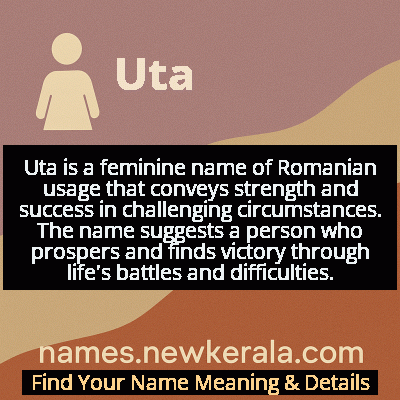Uta Name Meaning & Details
Origin, Popularity, Numerology Analysis & Name Meaning of Uta
Discover the origin, meaning, and cultural significance of the name UTA. Delve into its historical roots and explore the lasting impact it has had on communities and traditions.
Name
Uta
Gender
Female
Origin
Romanian
Lucky Number
6
Meaning of the Name - Uta
Uta is a feminine name of Romanian usage that conveys strength and success in challenging circumstances. The name suggests a person who prospers and finds victory through life's battles and difficulties.
Uta - Complete Numerology Analysis
Your Numerology Number
Based on Pythagorean Numerology System
Ruling Planet
Venus
Positive Nature
Harmonious, responsible, caring, and artistic.
Negative Traits
Overly idealistic, superficial, possessive, or jealous.
Lucky Colours
Pink, turquoise.
Lucky Days
Friday.
Lucky Stones
Diamond, turquoise.
Harmony Numbers
2, 3, 9.
Best Suited Professions
Artists, musicians, teachers, healthcare workers.
What People Like About You
Warmth, nurturing nature, artistic flair.
Famous People Named Uta
Uta Hagen
Actress and Acting Teacher
Tony Award-winning actress and influential acting teacher who authored 'Respect for Acting'
Uta Pippig
Long-distance Runner
Three-time Boston Marathon winner and former world record holder
Uta Ranke-Heinemann
Theologian and Author
First woman to hold a chair of Catholic theology in Germany and prominent religious scholar
Name Variations & International Equivalents
Click on blue names to explore their detailed meanings. Gray names with will be available soon.
Cultural & Historical Significance
In Romanian culture, Uta represents a bridge between Germanic and Eastern European naming traditions, often chosen by families with German heritage or those appreciating its strong, concise sound. The name embodies a connection to both warrior traditions and artistic expression, reflecting the dual nature of its meaning—prospering in battle while maintaining cultural refinement. Throughout the 20th century, the name maintained its cross-cultural appeal, particularly in Transylvanian regions where German and Romanian cultures have historically intersected. Today, Uta continues to symbolize this cultural synthesis while maintaining its core identity as a name of strength and prosperity.
Extended Personality Analysis
Individuals named Uta typically exhibit a remarkable combination of strength and sensitivity, embodying the name's warrior spirit while maintaining deep emotional intelligence. They are often perceived as determined and resilient, with an innate ability to overcome challenges through strategic thinking and perseverance. This core strength is balanced by artistic sensibility and intellectual curiosity, making Uta's equally comfortable in competitive environments and creative pursuits. Their natural leadership qualities emerge through quiet confidence rather than overt dominance, and they often inspire others through example rather than command.
The name suggests someone who approaches life's battles with both courage and wisdom, knowing when to stand firm and when to adapt. This balanced personality makes Uta's excellent problem-solvers who can navigate complex situations with both practical logic and emotional insight. They tend to be deeply principled individuals who value authenticity and integrity, often serving as moral compasses in their social and professional circles. While they can be fiercely competitive when necessary, Uta's typically prefer collaborative solutions and maintain a strong sense of fairness. Their combination of strategic thinking and emotional depth makes them particularly effective in leadership roles that require both tough decisions and compassionate understanding.
Modern Usage & Popularity
In contemporary naming practices, Uta maintains a distinctive presence as an uncommon but respected choice, particularly in Romania and among families with German heritage worldwide. While it never reached the popularity peaks of more common names, it has experienced a modest revival among parents seeking strong, historically rich names that stand out from current trends. In Romania, the name is often chosen by families appreciating its cross-cultural appeal and connection to European heritage. Modern usage trends show Uta as a name that conveys sophistication and strength without being overly common, making it attractive to parents wanting a unique but established name. Its stability in usage patterns suggests it occupies a permanent niche rather than following fleeting fashion trends, appealing particularly to educated, culturally aware families who value both tradition and individuality in their naming choices.
Symbolic & Spiritual Meanings
Symbolically, Uta represents the profound concept of victorious struggle and prosperous conflict, embodying the philosophical idea that true personal growth and achievement often emerge directly from overcoming significant challenges. The name carries deep connotations of the strategic warrior who not only survives life's battles but actually thrives and prospers through them, transforming adversity into distinct advantage and opposition into opportunity. Metaphorically, it suggests the alchemical process where struggle becomes strength and obstacles become stepping stones to greater success. Uta symbolizes the essential balance between feminine power and strategic intelligence, representing the modern woman who navigates both professional challenges and personal development with equal grace and effectiveness. The name also carries significant undertones of cultural bridge-building, symbolizing the harmonious connection between different European traditions and the successful integration of diverse cultural influences into a cohesive personal identity.

